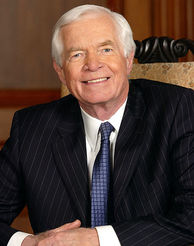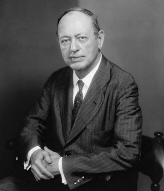McDaniel vs Cochran 2nd Most Competitive US Senate Primary in Mississippi History
The 2014 Mississippi Republican U.S. Senate primary is one of just two in state history decided by less than one point by either party
 The 2014 Mississippi U.S. Senate Republican primary election was highly anticipated due to the even odds that a six-term U.S. Senator could be defeated by a Tea Party challenger (for a second consecutive cycle after Dick Lugar of Indiana in 2012).
The 2014 Mississippi U.S. Senate Republican primary election was highly anticipated due to the even odds that a six-term U.S. Senator could be defeated by a Tea Party challenger (for a second consecutive cycle after Dick Lugar of Indiana in 2012).
Thad Cochran had faced only one primary opponent during his five previous reelection bids – Richard O’Hara, winning just 4.7 percent in 1996 – running without any GOP challengers in 1984, 1990, 2002, and 2008.
But this cycle Cochran faced two opponents including the well-funded State Senator Chris McDaniel.
Tuesday’s primary lived up to the hype – not only spawning a runoff to determine the nominee, but also nearly breaking the state record for the most closely decided U.S. Senate primary race Mississippi had ever witnessed.
Smart Politics examined the nearly 50 Democratic and Republican Mississippi U.S. Senate primaries that have been conducted since 1916 and found that the McDaniel vs. Cochran matchup yielded the second narrowest margin between the top two finishers in state history.
With 100 percent of precincts reporting, McDaniel led Cochran by 0.5 points – 49.5 percent to 49.0 percent, with Thomas Carey at 1.5 percent.
Only once in Mississippi history has a U.S. Senate primary battle been this tight for either party – in a contest held 80 years ago.
 The most competitive primary contest ever held in Mississippi for the nation’s upper legislative chamber came in 1934 when two-term incumbent Hubert Stephens squared off against three challengers that included former Governor Theodore Bilbo and seven-term U.S. Representative Ross Collins.
The most competitive primary contest ever held in Mississippi for the nation’s upper legislative chamber came in 1934 when two-term incumbent Hubert Stephens squared off against three challengers that included former Governor Theodore Bilbo and seven-term U.S. Representative Ross Collins.
Stephens edged Bilbo by just 0.1 points in the primary with 37.3 percent of the vote while Collins came in third with 24.6 percent.
Bilbo came back to win the subsequent runoff with 51.8 percent a few weeks later.
Stephens is one of three Mississippi U.S. Senators to lose a primary or primary runoff election.
In 1918, one-term incumbent James Vardaman was defeated by 9.7 points in the Democratic primary by Pat Harrison in a three-candidate field.
Harrison won 51.7 percent to narrowly avoid a runoff with Vardaman tallying 42.0 percent.
In 1942, Democrat Wall Doxey, who won a special election to the chamber one year prior, came in second to James Eastland in the primary in a five candidate field.
Eastland had 37.6 percent to Doxey’s 28.3 percent with 10-term Congressman Ross Collins in third at 27.4 percent.
Eastland prevailed in the primary runoff with 56.8 percent to win the seat for what would be the first of six terms in office.
Each of the last five runoff-bound first place finishers in a Mississippi U.S. Senate primary won the subsequent runoff election: Democrats James Eastland (1942), Maurice Dantin (1978), Ken Harper (1994), Troy Brown (2000), and Erik Fleming (2006).
Only James Vardaman in 1922 (beaten by Hubert Stephens) and Hubert Stephens in 1934 (defeated by Theodore Bilbo) placed first in the primary but lost the runoff.
Overall, the state’s 35 contested Democratic and Republican U.S. Senate primaries have been decided by an average of 39.4 points.
The 28 contested Democratic contests were decided by an average of 34.5 points while the seven Republican primaries with at least two candidates have been decided by an average of 58.7 points.
Only eight Mississippi U.S. Senate primaries have been decided by a difference of less than 10 percentage points between the first and second place finishers:
· 1934 (0.1 points): Hubert Stephens (37.3 percent), Theodore Bilbo (37.2 percent)
· 2014 (0.5 points): Chris McDaniel (49.5 percent), Thad Cochran (49.0 percent)
· 1978 (1.2 points): Maurice Dantin (29.0 percent), Cliff Finch (27.8 percent)
· 2002 (4.4 points): Steven Turney (52.2 percent), Bootie Hunt (47.8 percent)
· 1928 (5.2 points): Hubert Stephens (52.6 percent), T. Webber Wilson (47.4 percent)
· 1922 (5.5 points): James Vardaman (47.0 percent), Hubert Stephens (41.5 percent)
· 1942 (9.3 points): James Eastland (37.6 percent), Wall Doxey (28.3 percent)
· 1918 (9.7 points): Pat Harrison (51.7 percent), James Vardaman (42.0 percent)
The Top 20 Most Competitive Mississippi U.S. Senate Primaries
|
Rank
|
Year
|
Party
|
1st
|
%
|
2nd
|
%
|
# Cand
|
MoV
|
|
1
|
1934
|
Democrat
|
Hubert Stephens
|
37.3
|
Theodore Bilbo
|
37.2
|
4
|
0.1
|
|
2
|
2014
|
Republican
|
Chris McDaniel
|
49.5
|
Thad Cochran
|
49.0
|
3
|
0.5
|
|
3
|
1978
|
Democrat
|
Maurice Dantin
|
29.0
|
Cliff Finch
|
27.8
|
4
|
1.2
|
|
4
|
2002
|
Democrat
|
Steven Turney
|
52.2
|
Bootie Hunt
|
47.8
|
2
|
4.4
|
|
5
|
1928
|
Democrat
|
Hubert Stephens
|
52.6
|
T. Webber Wilson
|
47.4
|
2
|
5.2
|
|
6
|
1922
|
Democrat
|
James Vardaman
|
47.0
|
Hubert Stephens
|
41.5
|
3
|
5.5
|
|
7
|
1942
|
Democrat
|
James Eastland
|
37.6
|
Wall Doxey
|
28.3
|
5
|
9.3
|
|
8
|
1918
|
Democrat
|
Pat Harrison
|
51.7
|
James Vardaman
|
42.0
|
3
|
9.7
|
|
9
|
1988
|
Democrat
|
Wayne Dowdy
|
53.5
|
Dick Molpus
|
42.8
|
3
|
10.7
|
|
10
|
2000
|
Democrat
|
Troy Brown
|
36.6
|
Rickey Cole
|
20.6
|
5
|
16.0
|
|
11
|
1996
|
Democrat
|
Bootie Hunt
|
58.8
|
Shawn O’Hara
|
41.3
|
2
|
17.5
|
|
12
|
1994
|
Democrat
|
Ken Harper
|
46.7
|
Hiram Eastland
|
28.9
|
5
|
17.8
|
|
13
|
1940
|
Democrat
|
Theodore Bilbo
|
59.3
|
Hugh White
|
40.7
|
2
|
18.6
|
|
14
|
1946
|
Democrat
|
Theodore Bilbo
|
51.0
|
Tom Ellis
|
30.2
|
5
|
20.8
|
|
15
|
2006
|
Democrat
|
Erik Fleming
|
44.1
|
Bill Bowlin
|
22.1
|
4
|
22.0
|
|
16
|
1954
|
Democrat
|
James Eastland
|
62.0
|
Carroll Gartin
|
38.0
|
2
|
24.0
|
|
17
|
2008
|
Democrat
|
Erik Fleming
|
65.6
|
Shawn O’Hara
|
34.4
|
2
|
31.2
|
|
18
|
1936
|
Democrat
|
Pat Harrison
|
65.5
|
Martin Conner
|
33.2
|
3
|
32.3
|
|
19
|
2012
|
Democrat
|
Albert Gore
|
56.8
|
Roger Weiner
|
24.4
|
3
|
32.4
|
|
20
|
1978
|
Republican
|
Thad Cochran
|
69.0
|
Charles Pickering
|
31.0
|
2
|
38.0
|
Table compiled by Smart Politics.
Republicans did not hold their first primary in Mississippi until 1966.
Since then, the party has fielded candidates in 15 cycles, with more than half of these not drawing a primary challenger: Prentiss Walker (1966), Thad Cochran (1984, 1990, 2002, 2008), and Trent Lott (1988, 1994, 2000, 2006).
Prior to 2014, the low water mark for a first place Republican U.S. Senate primary finisher in the Magnolia State was the 69.0 percent recorded by Cochran during his initial U.S. Senate bid in 1978 when he defeated Charles Pickering in a two-candidate race.
On the Democratic side, there have been 34 cycles since the state’s first direct primary in 1916, although the party did not field any candidates in 1990.
Cochran and McDaniel will square off once again in the runoff in less than three weeks on June 24th.
Follow Smart Politics on Twitter.
